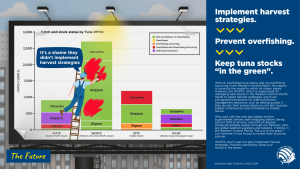The Global Tuna Alliance (GTA) is a pre-competitive collaboration of 53 independent retailers, suppliers, wholesalers, and brands active in the seafood sector and with a major interest in improving the sustainability of the tuna sector. Collectively, these companies form one of the world’s biggest networks of seafood wholesalers and suppliers to the consumer, particularly of tuna, purchasing 1.63 million tonnes worth US $1.3 billion in 2021 alone. This is roughly 30% of the global production. They are warning that failure to make progress at the upcoming session of the WCPFC could damage the commercial credibility of tuna stocks in the Western-Central Pacific.

The 19th session of the Western-Central Pacific Fisheries Commission (WCPFC) takes place from the 27th November to 3rd December in Da Nang, Vietnam. This year’s agenda includes items on harvest strategies, electronic monitoring and labour issues. These are all areas the GTA is seeking action on. While there is a proposal on the table for a skipjack management procedure, the GTA is concerned that its recommendation to delay full implementation by up to six years fails to grasp the urgency that may be needed to avoid this stock falling ‘out of the green,’ or in other words, prevent it from becoming overfished. With over half of all skipjack caught globally passing through GTA Partners, this is a troubling development and may lead to GTA Partners reviewing their sourcing policies.
While the Western and Central Pacific Ocean skipjack stock is considered healthy now, it has been declining over the long term, according to successive stock assessments. There are also new challenges are on the horizon, such as climate change; shifts in stock distribution; uncertain economic viability; increased competition; and other drivers of overfishing. Implementing the skipjack management procedure in December would mitigate risk and safeguard this valuable fishery for the future, and fulfil a commitment made by the WCPFC over eight years ago.
However, the GTA are concerned by the proposal from the Pacific Islands Forum Fisheries Agency (FFA), a group of 17 countries, who seek to trial this modern approach by up to six years. Without a management procedure in place to provide a science-based approach for addressing these shocks to the system, we are concerned that fishery managers would be under serious pressure to ignore scientific advice in a crisis, thus risking the health of the fishery. On the other hand, if the biomass increases, the management procedure could just as quickly permit increases in catch or fishing effort, without risking stability in catch rates.
Dr Tom Pickerell, Executive Director of the GTA explained: “The market, including GTA Partners, has evolved; they are no longer just looking at the current status of stocks. While obviously important, robust long-term management is increasingly seen as vital in long-term decision-making by businesses.”
“If delegates get it right at the upcoming WCPFC meeting, by accelerating the adoption of harvest strategies, it will only inspire greater confidence in the market in the long-term to continue purchasing tuna from the region.”
Michael McNicholas, CEO & President of GTA Partner Culinary Collaborations LLC. said, “Tuna stocks are currently healthy in the Western & Central Pacific Ocean – but we need these stocks to remain ‘in the green’ for us to continue sourcing from them. To do this, we are calling for the implementation of comprehensive management procedures.”
Princes Ltd., also a GTA Partner explained, “The long-term sustainability of tuna stocks is a business-critical issue to Princes. While we appreciate that the major tuna stocks in the Western and Central Pacific are ‘in the green,’ we call on the WCPFC to adopt and implement without delay a management procedure for skipjack, and agree a revised workplan for setting Target Reference Points (TRPs) for bigeye and yellowfin in 2023 – with adoption of interim TRPs this year.”